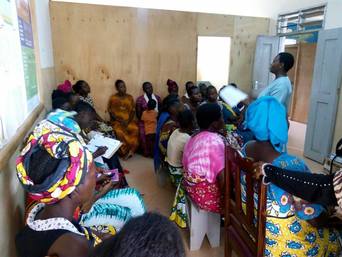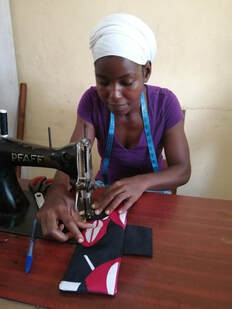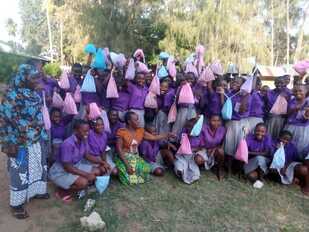The Challenge
Uptake of Maternal Health and HIV services is poor in much of Kilifi County, including in Dabaso, resulting in high and increasing rates of maternal mortality, high rates of malnutrition and stunting, and high defaulter rates of people with HIV from antiretroviral therapy.
Our Approach |
Our Sponsors |
|
We use the following strategies to address these challenges in Dabaso/Gede Health Centre catchment area and also for 4 Health Centres in Magarini sub-county.
In 2018, we were able to double the number of women attending antenatal clinics four times during their pregnancy and have 120 people with HIV regularly receiving group support to adhere to their anti-retroviral therapy. |
Currently funded by USAID through a partnership with Pathfinder International in the Afya Pwani project.
|
Door-to-Door
Individual Community Health Volunteers (CHVs) visit their 20 households on a regular basis, checking on the health status of the family, whether any woman is pregnant and encouraging them to use the health services on offer at the Gede Health Center or during outreaches. They also counsel the family on reproductive health, family planning, safe motherhood, child health, nutrition, HIV, malaria, TB, hygiene and sanitation.
Occasionally, several CHVs will work together as a small group, to go door-to-door in a specific area to conduct similar activities. Additional topics covered in this strategy are Gender-based Violence and Child Abuse. One partner also trained the group to conduct nutritional assessments of children using the MUAC (middle upper am circumference) tapes
Occasionally, several CHVs will work together as a small group, to go door-to-door in a specific area to conduct similar activities. Additional topics covered in this strategy are Gender-based Violence and Child Abuse. One partner also trained the group to conduct nutritional assessments of children using the MUAC (middle upper am circumference) tapes
Dialogue Days
CHVs mobilize community members to attend a meeting during which any issue troubling the community can be discussed. Usually between 100 and 150 people attend. The sessions are facilitated by the CHVs who encourage discussion and problem-solving among the group themselves. Often the Clinical Officer and the Public Health Officer from the Health Center as well as an Agricultural Extension Officer will also attend to provide technical advice when needed. Topics can range from GBV and teenage pregnancy to the quality of services in the Health Center or baboons destroying crops. the sessions are held once every month, each time in a different village.
Mama Support Groups
|
Pregnant and new mothers join a support group which meets regularly at the health facility to receive talks from the nurses, Public Health Officer or CHVs regarding pregnancy, child birth and infant care. They discuss issues they have experienced around pregnancy, child birth and exclusive breast-feeding and support each other. Exclusive breast-feeding is highly encouraged world-wide, for all mothers, since it provides all of the essential nutrients necessary for the infant and comes with no risk of infection from dirty utensils. Exclusive because introducing anything else, even water, irritates the intestinal-lining or can introduce bacteria.
|
Menstrual Hygiene
|
In 2019 we have started a new project funded by the Waterloo Foundation, UK, in partnership with Freedom4Girls, UK. We aim to produce and distribute reusable sanitary pads to girls in primary schools to help them stay in school during their menstrual period every month. The distribution will be combined with lessons on the menstrual cycle and good menstrual hygiene practices, to both girls and boys in the target schools. We are partnering with Watoto Kenya ONLUS and their team of tailors to train up 3 more tailors to produce the pads for us. These tailors are single mums and we hope to give their income a boost through the sales of the new product.
|
Referrals
A critical component of all of the interventions is referral to the Health Center or elsewhere for whatever services are needed. The CHVs each have a book of referral slips which they complete and enables the CHV and the service providers to track referrals, to ensure clients actually receive the services they need.
Outreaches
Gede Health Center conducts mobile outreaches every month to villages distant from their physical location. Nurses and HIV counselors travel to the villages equipped to conduct baby growth monitoring, immunizations, family planning, HIV testing and counselling and provide basic curative medicines. The CHVs mobilize the community for the outreach and provide health education on the day on a one-to-one or small group basis.



